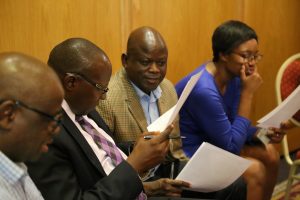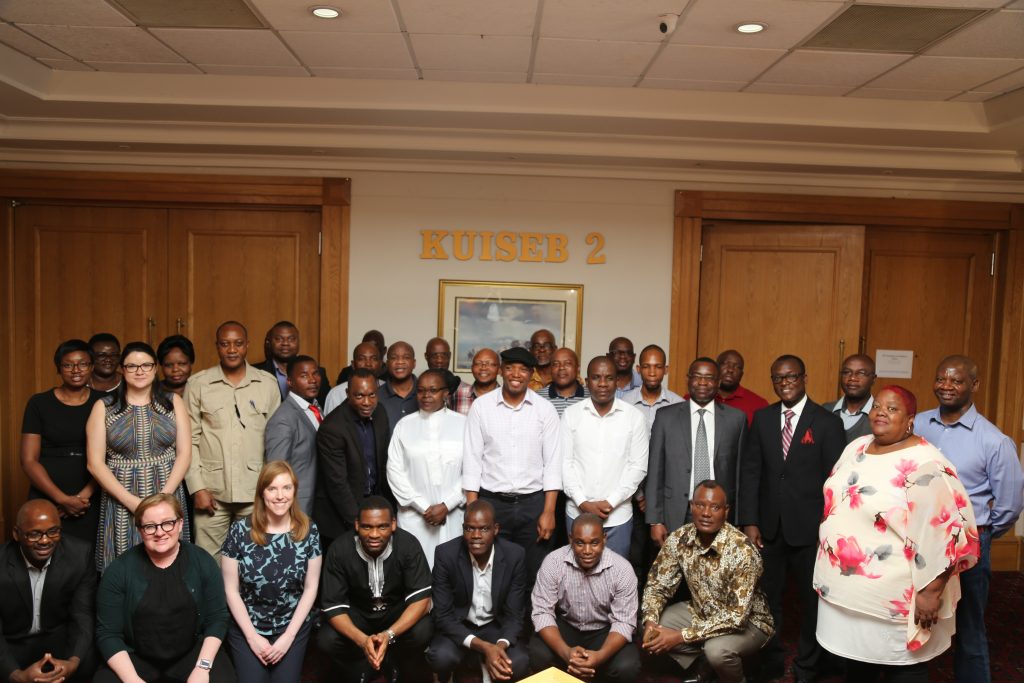 Thirty-five government and civil society representatives from nine countries and eight Arms Trade Treaty (ATT) experts met from 09-12 December 2019 to attend the first in-person session of the ATT Academy in Southern Africa. Organized in partnership with the Ministry of Defence of Namibia, and funding support from the ATT Voluntary Trust Fund, the ATT Academy provided an in-depth and tailored learning opportunity to carefully selected participants from Botswana, the Democratic Republic of Congo, Eswatini, Lesotho, Madagascar, Malawi, Mozambique, Namibia and Zambia to support their work relating to the implementation of the ATT.
Thirty-five government and civil society representatives from nine countries and eight Arms Trade Treaty (ATT) experts met from 09-12 December 2019 to attend the first in-person session of the ATT Academy in Southern Africa. Organized in partnership with the Ministry of Defence of Namibia, and funding support from the ATT Voluntary Trust Fund, the ATT Academy provided an in-depth and tailored learning opportunity to carefully selected participants from Botswana, the Democratic Republic of Congo, Eswatini, Lesotho, Madagascar, Malawi, Mozambique, Namibia and Zambia to support their work relating to the implementation of the ATT.
In his opening remarks, Rear-Admiral Peter H. Vilho, Executive Director of the Namibian Ministry of Defence, reminded participants that in 2016, over half a million people worldwide lost their lives violently, either because of direct conflict or in homicides, and 10.3 million people were newly displaced by conflict. “For too long,” R.Adm. Vilho declared, “millions of civilians around the world pay the price for the lack of legally binding rules governing arms transfers, especially women and children.” To meet these challenges, R.Adm Vilho emphasized the importance of firm commitments to multilateral instruments, including the ATT and “to work in tandem with other international and regional instruments, including the UN Programme of Action (UNPoA) and its International Tracing Instrument (ITI), the Firearms Protocol, and the Southern African Development Community (SADC) Protocol”. R.Adm. Vilho then recognized the benefits of projects such as the ATT Academy in Southern Africa, that offer an opportunity to discuss ATT implementation, identify good practices and exchange information that can assist states in the SADC region in addressing these challenges.
 The ATT Academy in Southern Africa focused on the scope and general implementation of the ATT and highlighted the importance of Articles 8 and 9, which address the responsibilities of importing and transit and transshipment states to prevent illicit arms transfers and diversion. The training devoted significant time discuss Article 15, which addresses international cooperation and assistance in support of ATT universalization and implementation. The ATT Academy also stressed the importance of the complementarity between international and regional instruments that address security, human rights and development challenges including the Sustainable Development Agenda.
The ATT Academy in Southern Africa focused on the scope and general implementation of the ATT and highlighted the importance of Articles 8 and 9, which address the responsibilities of importing and transit and transshipment states to prevent illicit arms transfers and diversion. The training devoted significant time discuss Article 15, which addresses international cooperation and assistance in support of ATT universalization and implementation. The ATT Academy also stressed the importance of the complementarity between international and regional instruments that address security, human rights and development challenges including the Sustainable Development Agenda.
Participants also explored ways in which the ATT can address challenges of particular relevance to Southern Africa, such as wildlife poaching and gender-based violence (GBV). Expert speakers, discussion groups and hypothetical exercises encouraged participants to ask questions and relate ATT obligations to their national context.

The participants will meet again in June 2020 for a second training to explore ATT implementation with a focus on methods to develop national control lists for and facilitate transparent reporting on arms transfers. This meeting will also provide an opportunity to identify concrete action that ATT States Parties can take to address wildlife poaching and GBV in Southern Africa. Between the two meetings, Control Arms will also prepare webinars for the participants on similar topics including gender-based violence and facilitate regular communication among participants.
The ATT Academy is a joint project organized by the Namibian Ministry of Defence and Control Arms, with funding from the Voluntary Trust Fund and support from the International Human Rights Clinic at Harvard Law School.
